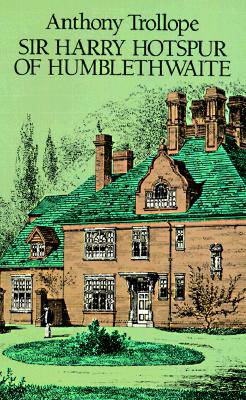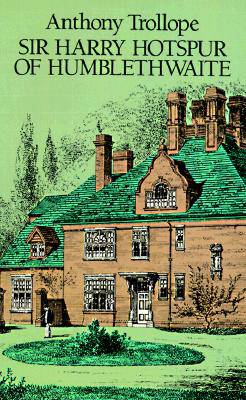
Bedankt voor het vertrouwen het afgelopen jaar! Om jou te bedanken bieden we GRATIS verzending (in België) aan op alles gedurende de hele maand januari.
- Afhalen na 1 uur in een winkel met voorraad
- In januari gratis thuislevering in België
- Ruim aanbod met 7 miljoen producten
Bedankt voor het vertrouwen het afgelopen jaar! Om jou te bedanken bieden we GRATIS verzending (in België) aan op alles gedurende de hele maand januari.
- Afhalen na 1 uur in een winkel met voorraad
- In januari gratis thuislevering in België
- Ruim aanbod met 7 miljoen producten
Zoeken
€ 15,45
+ 30 punten
Uitvoering
Omschrijving
"When George Hotspur entered the room, his cousin was dancing with a prince. Thus the hand of Emily, the only child and heiress of the vastly wealthy Sir Harry Hotspur of Humblethwaite, is eagerly pursued by Europe's "princes and potentates." Their hopes are quickly dashed, however; Emily's heart is pledged to her impecunious cousin George.
A fairy tale? Not in the least! As even his love-blinded cousin knows too well, George is no humble or virtuous knight. Except for his attachment to her, he knows little but carousing with his unsavory cronies, evading his creditors and betting his last -- borrowed -- shillings at the races. Sir Harry, who in the main naturally opposes the match, has yet one powerful incentive to support it: after his demise, George will become Sir George, and the cousins' marriage would maintain the centuries-old tie between the title and the family estates. Sir Harry is in a quandary, and meanwhile the virtuous Emily is bent on reforming her scapegrace cousin. Then unwelcome news arrives, further complications ensue, and the once complacent Hotspurs are forever wrenched from their placid existence.
Anthony Trollope (1815-1882), best known for his panoramic studies of Victorian society, could also be a keen, uncompromising psychologist. In 1868 he laid aside his famous Palliser series of novels, then in progress, and conceived a brief, poignant tale that would thoroughly explore the minds, hearts, and intertwined fates of just a few characters. The result was the present novel, one that treads familiar pathways of love and parental opposition but insistently avoids trite resolutions, probes deep, and is totally uncloying in its pathos.
As we read this compelling story -- here in its first inexpensive edition in many years -- we rediscover, as the best Victorian literary artist knew, how character is destiny -- and at the same time how an individual destiny is as unpredictable as life itself. No Trollope fan or lover of quality fiction should miss this unjustly neglected Trollope gem.
A fairy tale? Not in the least! As even his love-blinded cousin knows too well, George is no humble or virtuous knight. Except for his attachment to her, he knows little but carousing with his unsavory cronies, evading his creditors and betting his last -- borrowed -- shillings at the races. Sir Harry, who in the main naturally opposes the match, has yet one powerful incentive to support it: after his demise, George will become Sir George, and the cousins' marriage would maintain the centuries-old tie between the title and the family estates. Sir Harry is in a quandary, and meanwhile the virtuous Emily is bent on reforming her scapegrace cousin. Then unwelcome news arrives, further complications ensue, and the once complacent Hotspurs are forever wrenched from their placid existence.
Anthony Trollope (1815-1882), best known for his panoramic studies of Victorian society, could also be a keen, uncompromising psychologist. In 1868 he laid aside his famous Palliser series of novels, then in progress, and conceived a brief, poignant tale that would thoroughly explore the minds, hearts, and intertwined fates of just a few characters. The result was the present novel, one that treads familiar pathways of love and parental opposition but insistently avoids trite resolutions, probes deep, and is totally uncloying in its pathos.
As we read this compelling story -- here in its first inexpensive edition in many years -- we rediscover, as the best Victorian literary artist knew, how character is destiny -- and at the same time how an individual destiny is as unpredictable as life itself. No Trollope fan or lover of quality fiction should miss this unjustly neglected Trollope gem.
Specificaties
Betrokkenen
- Auteur(s):
- Uitgeverij:
Inhoud
- Aantal bladzijden:
- 256
- Taal:
- Engels
Eigenschappen
- Productcode (EAN):
- 9780486249537
- Verschijningsdatum:
- 2/11/2011
- Uitvoering:
- Paperback
- Formaat:
- Trade paperback (VS)
- Afmetingen:
- 137 mm x 215 mm
- Gewicht:
- 263 g

Alleen bij Standaard Boekhandel
+ 30 punten op je klantenkaart van Standaard Boekhandel
Beoordelingen
We publiceren alleen reviews die voldoen aan de voorwaarden voor reviews. Bekijk onze voorwaarden voor reviews.









